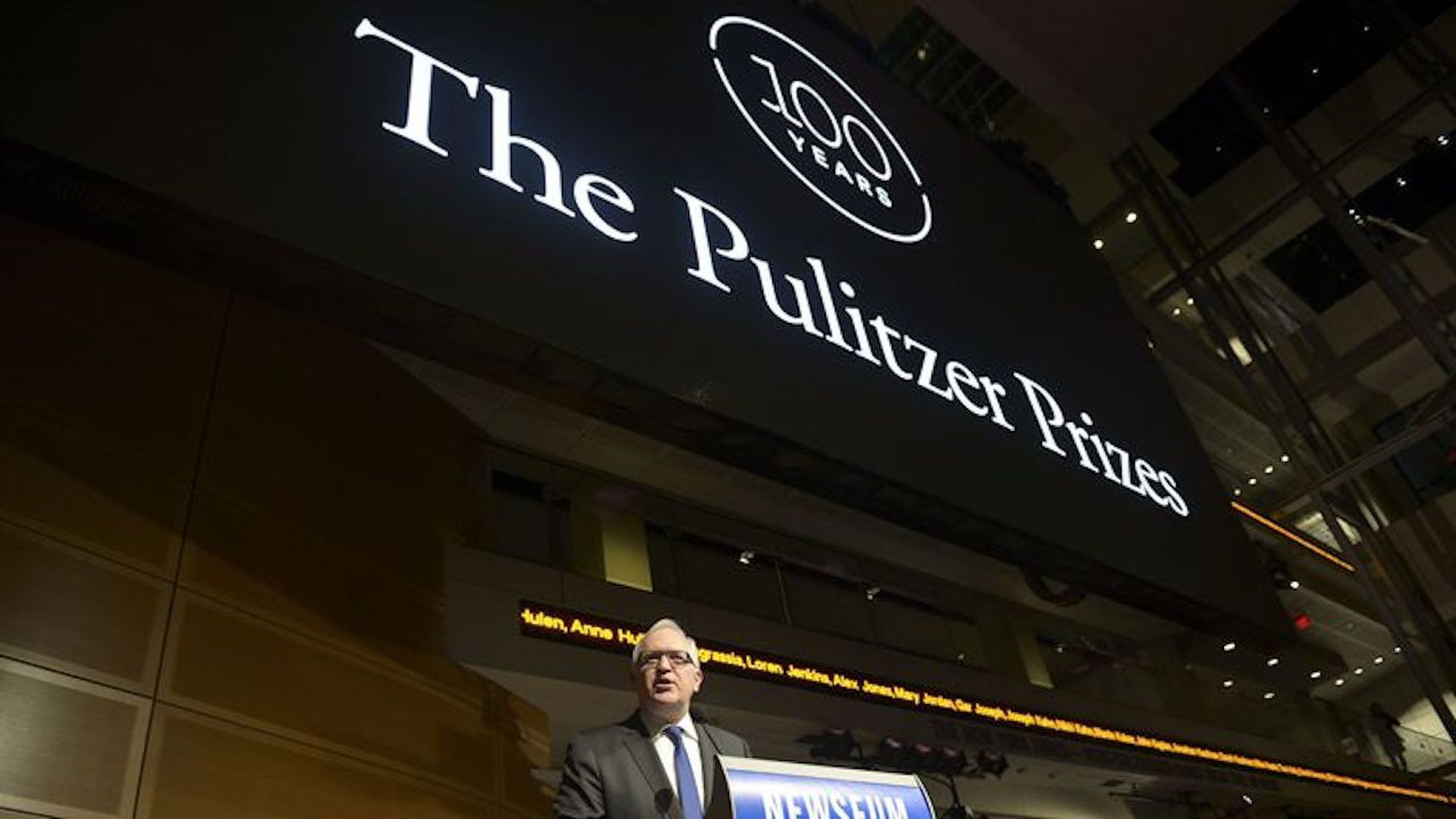Full list: 2021 Pulitzer Prize winners for journalism
Add Axios as your preferred source to
see more of our stories on Google.

Photo by Leigh Vogel/Getty Images
The 2021 Pulitzer Prize winners were announced Friday after one of the toughest years for journalism in recent memory. Many award recipients this year were recognized for their work covering the COVID-19 pandemic and the racial justice protests in the wake of George Floyd's murder last year.
Of note: The Pulitzer Board awarded a special citation to Darnella Frazier, the teenager who filmed George Floyd's murder on her cell phone.
Be smart: Buzzfeed News took home its first Pulitzer for its work covering the Chinese government for the mass detention of Muslims. The Atlantic also took home its first-ever Pulitzer for its coverage of COVID-19. The Minneapolis Star Tribune was awarded a prize for its coverage of the death of George Floyd.
Full list of winners in journalism and descriptions of their awards, via The Pulitzer Board:
Public Service (1917-present)
- Winner: The New York Times won for "courageous, prescient and sweeping coverage of the coronavirus pandemic that exposed racial and economic inequities, government failures in the U.S. and beyond, and filled a data vacuum that helped local governments, healthcare providers, businesses and individuals to be better prepared and protected."
Breaking News Reporting (1998-present)
- Winner: The Minneapolis Star Tribune won for "its urgent, authoritative and nuanced coverage of the death of George Floyd at the hands of police in Minneapolis and of the reverberations that followed."
Investigative Reporting (1985-present)
- Winner: Matt Rocheleau, Vernal Coleman, Laura Crimaldi, Evan Allen and Brendan McCarthy of the Boston Globe for "reporting that uncovered a systematic failure by state governments to share information about dangerous truck drivers that could have kept them off the road, prompting immediate reforms."
Explanatory Reporting (1998-present)
- Winner: Andrew Chung, Lawrence Hurley, Andrea Januta, Jaimi Dowdell and Jacki Botts of Reuters for "an exhaustive examination, powered by a pioneering data analysis of U.S. federal court cases, of the obscure legal doctrine of “qualified immunity” and how it shields police who use excessive force from prosecution."
- Winner: Ed Yong of The Atlantic for "a series of lucid, definitive pieces on the COVID-19 pandemic that anticipated the course of the disease, synthesized the complex challenges the country faced, illuminated the U.S. government’s failures and provided clear and accessible context for the scientific and human challenges it posed."
Local Reporting (1948-1952, 2007-present)
- Winner: Kathleen McGrory and Neil Bedi of the Tampa Bay Times for "resourceful, creative reporting that exposed how a powerful and politically connected sheriff built a secretive intelligence operation that harassed residents and used grades and child welfare records to profile schoolchildren."
National Reporting (1948-present)
- Winner: The Marshall Project, AL.com, IndyStar and the Invisible Institute, Chicago for "a year-long investigation of K-9 units and the damage that police dogs inflict on Americans, including innocent citizens and police officers, prompting numerous statewide reforms."
International Reporting (1948-present)
- Winner: Megha Rajagopaulan, Alison Killing and Christo Buschek of BuzzFeed News for "a series of clear and compelling stories that used satellite imagery and architectural expertise, as well as interviews with two dozen former prisoners, to identify a vast new infrastructure built by the Chinese government for the mass detention of Muslims."
- Of note, this award was moved by the Board from the Explanatory Reporting category, where it was also entered and nominated, the Board said.
Feature Writing (1979-present)
- Winner: Mitchell S. Johnson of Runners' World for "a deeply affecting account of the killing of Ahmaud Arbery that combined vivid writing, thorough reporting and personal experience to shed light on systemic racism in America."
- Winner: Nadja Drost of the California Sunday Magazine for "a brave and gripping account of global migration that documents a group’s journey on foot through the Darién Gap, one of the most dangerous migrant routes in the world."
Commentary (1973-present)
- Winner: Michael Paul Williams of the Richmond Times-Dispatch for a "penetrating and historically insightful columns that guided Richmond, a former capital of the Confederacy, through the painful and complicated process of dismantling the city's monuments to white supremacy."
Criticism (1973-present)
- Winner: Wesley Morris of The New York Times for an "unrelentingly relevant and deeply engaged criticism on the intersection of race and culture in America, written in a singular style, alternately playful and profound."
Editorial Writing (1917-present)
- Winner: Robert Greene of the Los Angeles Times for "editorials on policing, bail reform, prisons and mental health that clearly and holistically examined the Los Angeles criminal justice system."
Editorial Cartooning (1922-present)
- Winner: There was no prize awarded in Editorial Cartooning.
Breaking News Photography (2000-present)
- Winner: Photography staff of the Associated Press (AP) for "a collection of photographs from multiple U.S. cities that cohesively captures the country's response to the death of George Floyd."
Feature Photography (1968-present)
- Winner: Emilio Morenatti of Associated Press (AP) for "a poignant series of photographs that takes viewers into the lives of the elderly in Spain struggling during the COVID-19 pandemic."
Audio Reporting (2020-present)
- Winner: The New Lisa Hagen, Chris Haxel, Graham Smith and Robert Little of National Public Radio (NPR) for "an investigative series on “no compromise” gun rights activists that illuminated the profound differences and deepening schism between American conservatives."
Go deeper:
